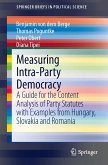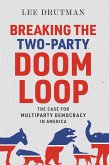The Challenges of Intra-Party Democracy provides a comprehensive examination of both the concept and the practice of intra-party democracy (IPD). Acknowledging that IPD is now widely viewed, among both democratic practitioners and scholars, as a normative good, this volume suggests that there is no single, or uniformly preferred, form of IPD. Rather, each party's version of IPD results from a series of choices they make relating to the organization and division of power internally. These decisions reflect many variables including a party's democratic ethos, its electoral context, state regulation and whether or not it is in government. Individual chapters examine the relationship between party models and IPD, the decline in party membership and activism, the role of the state in regulating party democracy, issues relating to gender and party organization, norms of candidate and leadership recruitment and selection, party policy development and party finance. The analysis considers the principal issues that parties (and the state) must consider relating to IPD in each area of party activity, the range of options open to them, current trends in terms of paths chosen, what these choices tell us about parties and, most importantly, what the implications of these choices are. In doing so, we offer a common language and set of questions relating to IPD that enhance the ability for consistent evaluation of the state of internal party democracy. Through thorough analysis of associated costs and benefits, we also provide a framework to assist with considerations of IPD reforms - particularly in terms of their scope, the range of options available and their implications. Comparative Politics is a series for students, teachers, and researchers of political science that deals with contemporary government and politics. Global in scope, books in the series are characterised by a stress on comparative analysis and strong methodological rigour. The series is published in association with the European Consortium for Political Research. For more information visit: www.ecprnet.eu. The Comparative Politics series is edited by Professor David M. Farrell, School of Politics and International Relations, University College Dublin, and Kenneth Carty, Professor of Political Science, University of British Columbia.
Dieser Download kann aus rechtlichen Gründen nur mit Rechnungsadresse in A, B, BG, CY, CZ, D, DK, EW, E, FIN, F, GR, HR, H, IRL, I, LT, L, LR, M, NL, PL, P, R, S, SLO, SK ausgeliefert werden.









